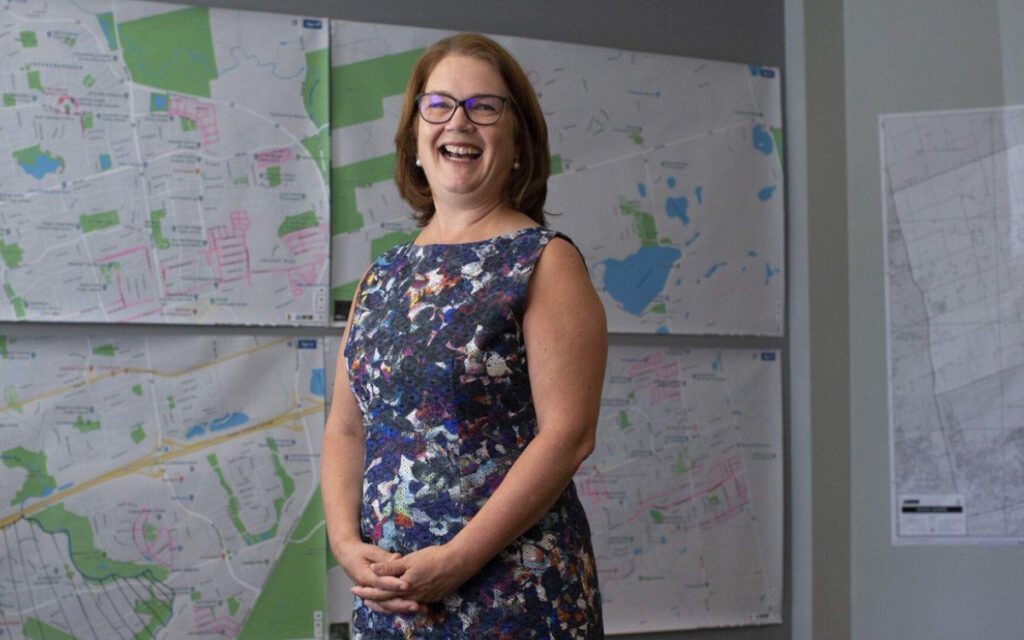
Philpott will chair a new primary care action team with the heady objective of connecting every person in Ontario to a family doctor or nurse practitioner. Pictured: Dr. Jane Philpott. Photo Credit: Jane Philpott/X.
Ontario Premier Doug Ford seems to be having fun, stirring up a whirlwind of speculation about early election calls with constant government announcements.
Banning bike lanes that take block traffic, easing Hwy 401 traffic congestion by tunneling beneath the road, handing out $200 checks to taxpayers to help with the rising cost of living, creating a multi-employer pension plan for skilled workers, providing more money for fruit growers, supportive housing, mental health and wildland fire protection.
The list goes on.
Opposition critics have had a field day accusing Ford of throwing down bright, shiny “baubles” to distract voters from more critical issues like health care. But is he?
Lost in the turmoil was a health announcement that could have a more significant long-term impact on voters than the shiny “baubles.” Health Minister and Deputy Premier, Sylvia Jones has appointed Dr. Jane Philpott as chair of a new primary care action team with the heady objective of connecting every person in Ontario to either a family doctor or nurse practitioner.
It is ambitious no doubt. The Ontario Medical Association, in a recent statement calling the provincial health system a “catastrophe,” said that more than 2.5 million people in Ontario are without a family doctor and predicted that this will double in the next two years. Just about every voter has a tale of their own or a loved ones’ challenge accessing care at one time or another.
Dr. Philpott, as political observers will recall, used to be a high-profile minister in Prime Minister Justin Trudeau’s cabinet, widely regarded as one of his most capable. In what is these days a rare occurrence, she quit her job on a matter of principle, to protest how the Prime Minister was handling a criminal case involving Canadian construction company, SNC Lavalin.
Since then, her work in health care has only enhanced her reputation. Most recently the Dean of the Faculty of Heath Sciences at Queen’s University and Director of its School of Medicine, she has published a book entitled “Health for All: A Doctor’s Prescription for a Healthier Canada.”
Her thesis is that the province should adopt the same approach to front-line health care as it does to education – every child is able to go to school and every community is served by one. Why not adopt the same approach for front-line health care?
“Ontario can build a health system where the guarantee of access to a primary care team is as automatic as the assurance that every child will be assigned to a public school in their neighbourhood,” she said in the government’s news release.
“Our goal will be for 100 percent of Ontarians to be attached to a family doctor or nurse practitioner working in a publicly funded team, where they receive ongoing, comprehensive care and people can access that care in a timely way.”
Despite the views of critics, the government has not been ignoring the challenge, for the sake of banning bike lanes. For example, it has opened two new medical schools and significantly expanded “medical school seats” for undergraduate and residency training positions.
So far, it has increased the supply of family doctors by 10 per cent with more to come. It has also expanded access to primary care services through pharmacies and more clinics led by nurse practitioners.
It has also responded to doctors’ requests to reduce their administrative burden. Filling out insurance forms, writing up “sick notes”, writing reports, all take up too much of a doctor’s valuable time when it could be better used providing patient care.
Work is underway, in cooperation with the OMA, to streamline and simplify various government medical forms, to explore the use of more digital tools and Artificial Intelligence (AI) to reduce the amount of time a doctor must spend writing notes or completing forms.
Other steps certainly need to be taken by both provincial and federal governments if our health care system is to improve – national licensure of physicians so they can work across provincial boundaries, better compensation models to support primary care providers, more foreign trained medical graduates, more virtual care options, more flexible, out-of-hospital procedures – it is a lengthy list.
Reducing a doctor’s administrative burden, connecting more patients to front-line providers or increasing the number of medical school graduates don’t create headlines as exciting as tunneling under the 401 or handing out $200 checks. But they are steps in the right direction that may matter more to voters in the long run.

Janet Ecker is a former Ontario Finance Minister, Minister of Education, Minister of Community and Social Services and Government House Leader in the governments of Premier Mike Harris and Premier Ernie Eves. After her political career, she served as the founding CEO of the Toronto Financial Services Alliance, a public-private partnership dedicated to building Toronto region into an international financial centre. She currently sits on a number of corporate and non-profit boards, agencies and advisory committees.
Ms. Ecker received the Order of Canada for her public service contributions and was recognized as one of the “Most Influential People in the World’s Financial Centres” by Financial Centres International. She also received a “Canada’s Most Powerful Women: Top 100 Award” from the Women’s Executive Network and the Richard Ivey School of Business, among other awards. She is also one of the founders of Equal Voice, a national, multi-partisan organization working to elect more women.






